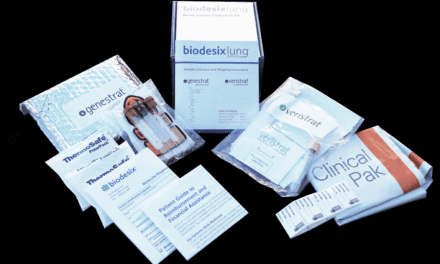GenomeDx Biosciences, San Diego, has launched the Decipher bladder cancer classifier following publication of a study supporting its development and validation.1 According to the company, the clinical assay subtypes muscle-invasive bladder cancer (MIBC) with a high degree of accuracy.
“We believe that Decipher bladder is the first commercially available genomic test available for muscle-invasive bladder cancer patients facing very challenging decisions around their care,” says Doug Dolginow, MD, CEO of GenomeDx. “We believe that use of genomic information will be essential for all patients with MIBC and are excited to see further results from our ongoing studies of Decipher and the Decipher Genomics Resource Information Database (GRID) genome-wide expression analysis that support the utility of genomics in this underserved population.”
Molecular subtyping of MIBC may be used to better prioritize patients diagnosed with aggressive bladder cancer to pursue underutilized standard-of-care chemotherapy before bladder removal surgery. MIBC is a high-grade bladder tumor that has significant risks of recurrence, metastasis, and death. The standard treatment for these patients is neoadjuvant chemotherapy (NAC) followed by radical cystectomy.
The prospectively designed retrospective study enrolled 343 patients with MIBC treated at seven institutions from Canada, Europe, and the United States. Using the Decipher assay, the samples were classified with a high degree of accuracy (AUC >0.85), according to four consensus subtypes proposed by the University of North Carolina, The Cancer Genome Atlas project, and other leading MIBC research groups. In 305 evaluable patients, the study validated the previous findings that patients with favorable prognosis luminal tumors had the best overall survival, irrespective of treatment regimen, while patients with basal tumors showed a nearly 30% improvement in overall survival with NAC compared to surgery alone and should be prioritized for treatment.
“Despite evidence demonstrating a survival benefit of NAC in MIBC, uptake remains low,” says Peter Black MD, associate professor of urologic sciences at the University of British Columbia, and lead investigator of the study. “Use of Decipher to identify bladder cancer subtypes with the most to gain from chemotherapy may help improve its utilization in clinical practice. Decipher genome-wide RNA expression analysis has great potential as a tool to help us better treat patients and continue our research of bladder cancer that we believe will benefit future patients as well.”
For more information, visit GenomeDx Biosciences.
REFERENCE
- Seiler R, Ashab HAD, Erho N, et al. Impact of molecular subtypes in muscle-invasive bladder cancer on predicting response and survival after neoadjuvant chemotherapy. Eur Urol. 2017. Published online in advance of print. 5 April 2017; doi: 10.1016/j.eururo.2017.03.030.




